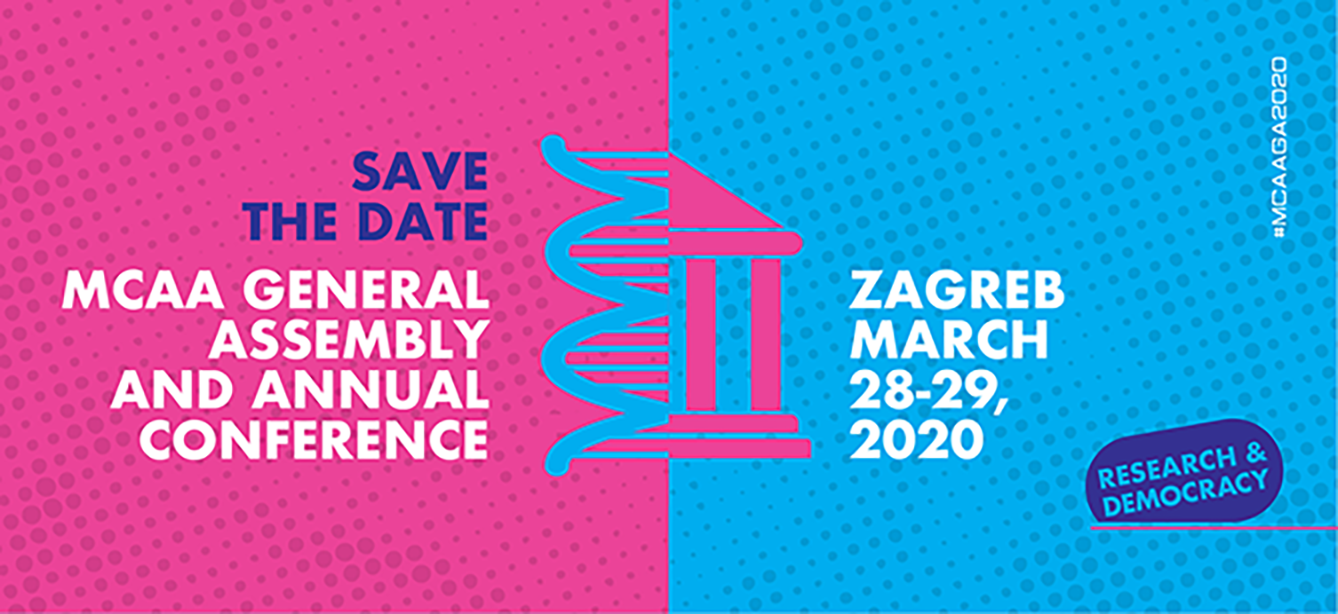General Assembly - Newsletter December 2019
NEWSLETTER
The Marie Curie Alumni Association will open its doors to host the 2020 General Assembly and Annual Conference in Zagreb, Croatia, on 28-29 March 2020. MCAA Chair, Matthew DiFranco, answers questions about this not-to-be-missed event.
Research and Democracy and all the theoretical and practical relevancies related to this timely topic will be explored at the 7th General Assembly and Conference, which is expected to go down as the most successful to date.
Below, some excerpts from an interview with Matthew DiFranco.
The General Assembly will take place this year from 28 to 29 March in Zagreb, Croatia. Could you tell us about the preparation and how is it going?
Following on the success of Vienna February 2019, we are excited about the planning and preparations for the 7th Annual MCAA General Assembly and Annual Conference in Zagreb, Croatia.
Our goal for the Annual Conference is to provide a forum to promote the main pillars of MCAA: promote networking and career development for our members and engage in science policy issues for the benefit of researchers and society. To make this happen, we are making some changes from last year to ensure that, while the programme provides high-quality and engaging content, attendees have more opportunities for training and networking before, during and after the event.
The organisation and planning for the event are managed by the “GA Task Force”, which is headed by Maja Mise from the Croatia Chapter and composed of MCAA board members, Croatia Chapter members, the MCAA Partnership group tasked with securing sponsors and partners for the event, and representatives of the contractors tasked with carrying out the work. Croatia Chapter members have been working since before Vienna 2019 to secure a venue, develop local and national support for the event, raise awareness in Croatia, and mobilise the volunteers working both before and during the event.
Why was Zagreb selected as the venue?
When the call for venues was open for the 2020 Annual Conference, the Croatia Chapter, which had only recently been established, expressed an interest in hosting the event in part because Croatia will hold the European Presidency in the first half of 2020. The MCAA Board received bids for Split and Zagreb in Croatia, as well as for Warsaw. Although all bids were of a high quality, we felt that the Zagreb bid represented the best opportunity for the MCAA Annual Conference in 2020.
In addition to the European Presidency coinciding with the MCAA Annual Conference, we also wanted to highlight the Widening Participation initiative of the European Commission, which aims to broaden participation in European research projects in certain EU Member States and Associated Countries.
The theme is ‘Research and Democracy’. Could you explain why?
Our theme this year, “Research and Democracy”, is aimed at global trends in politics, science and society. The programme will highlight issues including the rise of artificial intelligence, climate change, equality, science diplomacy, sustainable research careers, and many more.
Scientists and researchers have always played a crucial role in defending knowledge, and the right to pursue it, in democratic societies. Our goal is to highlight the past, present and future role of research in democratic societies and extract lessons to help shape how our community responds to the challenges we face today. Those challenges include not only the global rise of political threats to democratic values, but also the broader societal challenges best described by the UN Development Agency’s Sustainable Development Goals (SDGs). We hope that a wider recognition of SDGs amongst the research community, and the public at large, can be a catalyst for a stronger role of research and scientific knowledge in policy and politics.
What would you say to people who are considering joining this event?
We know from the feedback received from the past events that the strength of our Annual Conference lies in the people who attend as much as in the content of the programme. Unlike any other scientific conference, we bring together researchers who are ambitious, curious, diverse and mobile, and there is an energy and enthusiasm about our event which you truly have to experience for yourself to understand.
Most researchers are passionate about their work, eager to share ideas with others, and ambitious about the impact their work could have on society. However, their working environments don’t often support such passion and ambition. MCAA offers a community where researchers can take pride in their ideas, encourage ambition, and help build a personal, scientific and professional network.
Is there anything else you wish to add?
We encourage all MCAA members to consider attending the Annual Conference. For those still being funded under an MSCA programme, the MSCA Unit of the European Commission has formally approved the use of a project training budget for attendance at the MCAA Annual Conference.
In addition, there will be Board elections at the 2020 General Assembly, and we encourage any member interested in finding out more about the MCAA Board to get in touch with an MCAA Chapter, Working Group, or the Board itself to find out more about what we do, and where you could contribute. Nominations will be open until 31 January 2020, and more details can be found on the MCAA portal.
